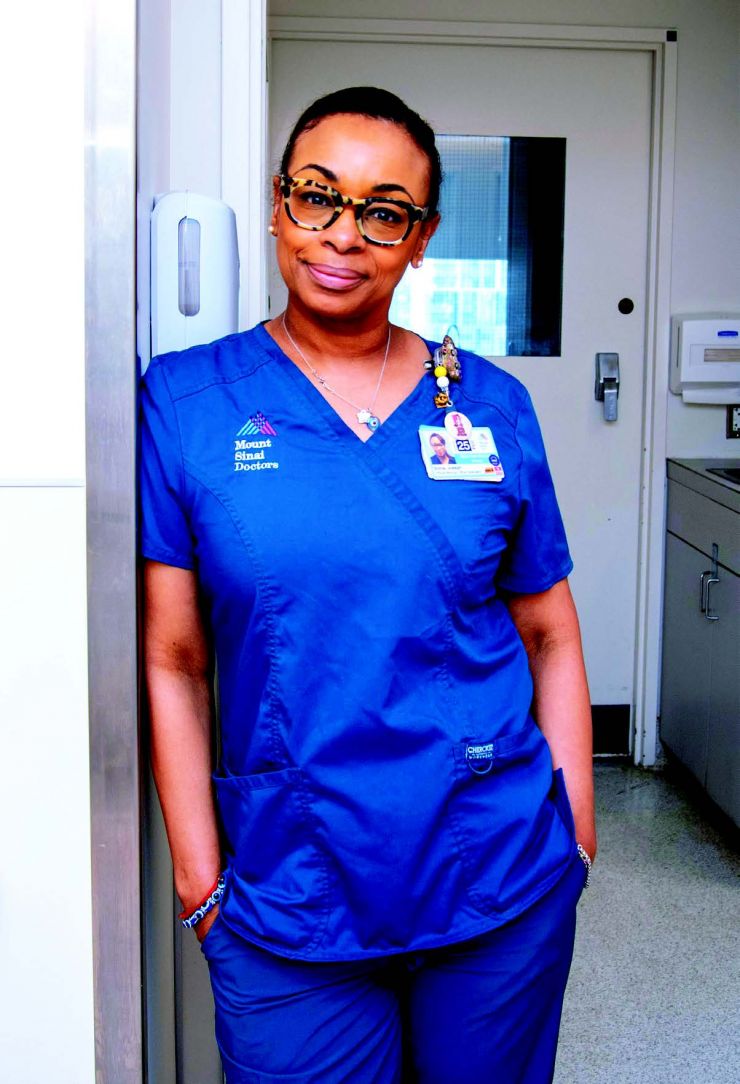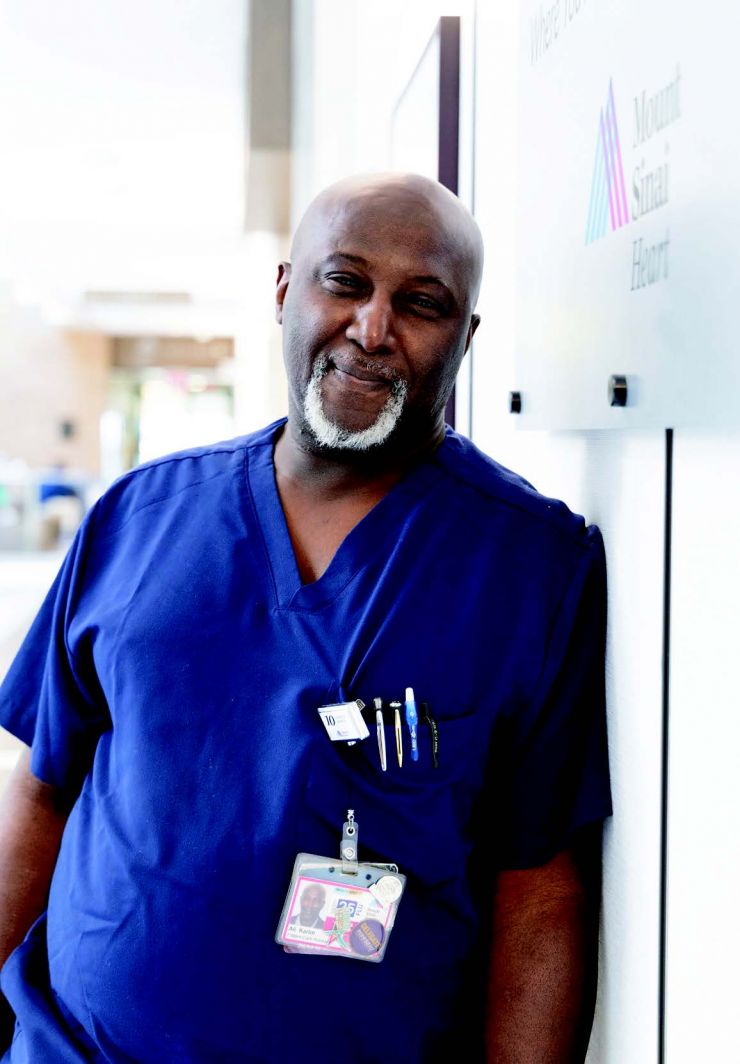Work We Do: Mont Sinai Care Team
January 9, 2025
When many people think about hospital staff, they often picture doctors and nurses. But as 1199ers know, quality patient care could never be achieved without the whole care team, which includes Patient Care Assistants (PCAs) and Medical Assistants. The 1199 Magazine recently met a few of these dedicated professionals at Mount Sinai Hospital in New York City to gain a better understanding of the important work involved in bedside care and patient preparation.

“I take pride in making sure that everyone is seen in a timely fashion,” she says. “I’m proactive. I get things ready before the doctor even asks.
I make sure that the doctor is running on time by figuring out what I can do first.”
Joseph, whose duties are similar to those of a Medical Assistant, has been working at Mt Sinai for nearly 40 years. She became an 1199 member and Delegate following the offsite organizing campaign in 2017.
“Patient interaction is the best part of my job,” Joseph says. “Regular patients appreciate a friendly face.”
Joseph says she became a Delegate because “people are afraid of management and I don’t mind speaking my mind.”
“I’m not intimidated, and I want to speak up for the little guy,” she says. “Management respects me.”

“When they started giving Covid vaccinations, some of our high-risk patients were not computer savvy,” the Medical Office Specialist says. “One patient came in crying hysterically. offered to take down their information and book their appointment. I booked more than 150 patients and received an award from the hospital for my service.”
Rosser has been a Delegate for the past seven years, and may be the first person a patient speaks to after receiving a positive test result. During her 18 years at the HIV clinic she has had a lot of practice helping patients work through their sadness.
“I let them know that being HIV+ is no longer a death sentence,” she says. “Medication will help you stay healthy. PrEP is like birth control [to prevent HIV transmission] and PEP is given after an exposure.” [People can be at risk of contracting HIV after sexual assault].
Seven years ago, after she became a Delegate, Rosser also helped negotiate a significant increase for a member who was receiving a salary of $49,000 for almost a year when the Union rate for her job was $93,000. When Rosser highlighted this pay discrepancy to management, they agreed to pay the higher rate as well as back pay.

Graham-Hauser has been at Mount Sinai West for 15 years and currently works at the intensive care step-down unit. She became a Delegate four years ago, because she saw the need to inform others about the contract and the benefits for Union members.
“We are short-staffed, and everyone is so busy,” she says. “But its important to exercise patience even when we are short. I had a patient who was very upset about having been diagnosed with head and neck cancer. I was able to calm her down and taught her deep breathing. The next day she was much less anxious. Never let anxiety get the better of you. Stress is a silent killer.”
Graham-Hauser says she simply has a “passion for taking care of people.”
“I always put myself in the shoes of the patient and think about how I would like to be treated, how I would feel in that bed,” she says.

“After that it was hard for me to come to work and be chummy,” Tobias says. “I didn’t want to be that person. My patients are the reason that I come to work. It brings me pleasure when I can make geriatric patients feel more comfortable and that they are not alone.”
Working on a medical/ surgical ward for the past two years, even management has recognized Tobias’ special ability to connect with patients. She is also highly regarded as a “skin champion” and someone who understands the importance of proper wound care, which includes making sure patients are turned regularly.
According to Tobias, she wanted to become a Delegate because she is someone who is “willing to stand up for myself and my co-workers.”
“I figured I could be a strong voice for people who didn’t feel comfortable fighting,” she says. With the help of the 1199SEIU Training and Education Fund, Tobias is now studying to be an RN at Lehman College in the Bronx where she is due to graduate in 2027.

Originally from Trinidad, James says she always like to speak up because “The boss is hoping that we don’t know what is in our contract. But know my contract, so they can’t win with me!”

A published poet, Karim recently wrote a poem for a 94-year-old patient on his ward. She was so pleased and told him that no one had ever done that for her before. After sharing another poem with a nurse on the palliative care unit, “she walked up to me and started to cry.”
An 1199 Delegate for the past six years, Karim was very disappointed with the outcome of this year’s presidential election.“There are going be some battles,” he predicts. “I know he is going to come for NYC. But we’re ready. We’re New York tough!”
Staffing levels were already challenging before the anticipated federal budget cuts, Karim points out and worries that they could get worse.
But he does find the work he does very rewarding, saying: “When I first joined the palliative care ward, initially I was skeptical about seeing people who are dying. Now, I wouldn’t trade it.”
Some patients do go home, however, and Karim says it is important to focus on how they feel during their hospital stay. A big part of his job is helping family members come to terms with the situation. Some don’t want to accept it. “We’re here to make sure patients get the best care at the end of their lives,” he says.

“I know when to say something and when to hold back,” she says.
Patients often come onto the ward after a period of sleeping rough, so the first thing Alleyne does is to make sure that they have a shower and change of clothes “to feel like a person again.” And because of the hospital’s location near the Upper East Side of Manhattan, Alleyne has sometimes looked after celebrities who were brought in for emergency psychiatric treatment.
“Sometimes, the patients will tell us more than they will tell the doctor,” Alleyne says. “They will tell us deep stuff and say we can’t tell the doctor. But we have to, so that they will get better.”
As a Delegate with more than three decades on the job, management has come to rely on her–sometimes too much. They will often ask Alleyne, for instance, to look after a difficult patient. “Stephanie, you can deal with it,” they say.
During the Presidential election, Alleyne gave up most of her Saturday’s to be a bus captain with Weekend Warriors. “The election outcome was depressing for me,” she says. “I couldn’t believe it. Why would people go with the Republicans when we know they don’t believe in unions.”

